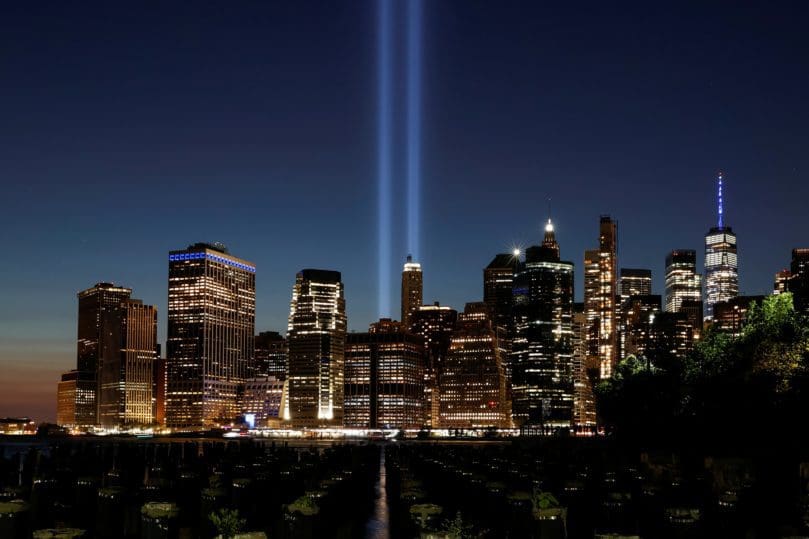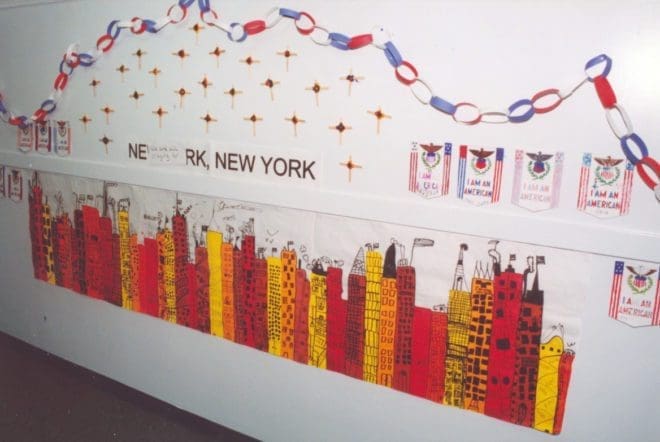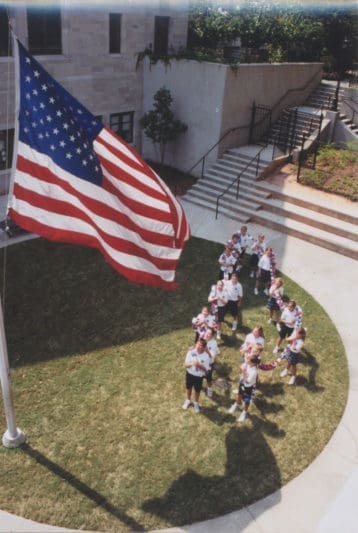 CNS Photo/Brendan McDermid, Reuters
CNS Photo/Brendan McDermid, ReutersAtlanta
Catholics remember 9/11 and look toward the future
By SAMANTHA SMITH, Staff Writer | Published September 16, 2021
ATLANTA—The day began as any Tuesday, but would include events that would reshape the United States and the world.
On the morning of Sept. 11, 2001, Gretchen Keiser was driving to work. At the time, she was an editor for The Georgia Bulletin. The staff was working on the next issue to come out later in the week. At that point, more than 80 percent of the paper had been completed.
On the radio, Keiser heard a plane crashed into the north tower of the World Trade Center. When she arrived at work, she along with the staff, watched the news and the unfortunate events that unfolded.
A second hijacked plane crashed into the south tower of the World Trade Center, a third into the Pentagon in Washington, D.C. and a fourth in rural Pennsylvania. As people evacuated the buildings and found safety, the towers of the World Trade Center collapsed, leaving a cloud of debris over New York City, hundreds of people missing and thousands dead. In one day, nearly 3,000 lives were lost.
“People were horrified,” said Keiser. “In the case of journalism, we had to turn to the work that we were doing on the issue.”
The staff took apart several pages of the paper that were already laid out and replaced the front page of the Sept. 13 issue. Being a weekly paper at the time, the team began thinking of stories for the following issue.
“It was very emotional, extremely emotional for everyone who worked there,” said Keiser.
The Sept. 20, 2001 issue of The Georgia Bulletin covered the local Catholic response to the tragic events of Sept. 11, 2001. A few people featured in that issue shared their experience of that day and how their lives and the local church have changed over the last 20 years.
An evening of prayer
On that fateful Tuesday, Ed Bolduc was home alone because his wife, Karen, had already left for work. Bolduc was the musician and composer at St. Ann Church in Marietta.
Moments later, Karen called and told him to turn on the television. He, like many others, watched the news and witnessed the tragic events of the day.
Soon after, the staff at St. Ann knew they wanted to do something, Bolduc explained. They decided to do an impromptu prayer service that night for the community.
“The focus became praying for peace, praying for faith, praying for comfort—finding songs with lyrics that help us pray for those whom we lost, including those who gave their lives to help others,” said Bolduc. “There was so much to pray for, especially hope.”

In the days following the September 11 attacks, the students at Our Lady of Assumption School in Atlanta redesigned a New York skyline mural to honor the lives lost. Georgia Bulletin File Photo
Music consisted of light instrumentation, which included piano, guitar, flute and a few singers, Bolduc explained. His wife Karen led the congregation in song at the service.
“I was so grateful to be working for the church at that moment,” said Bolduc, who is now the director of music and audio visual at the Marietta parish. “I knew we were going to be called upon to help people pray about these events transpiring before us.”
Even though Bolduc was shocked at the events of the day, he realized the importance of faith.
“I didn’t know what else to do except turn to God in prayer,” he said. “I prayed that God would help us, his people, find a way though and become stronger as we lived with this new reality, that we wouldn’t fall apart, but unite and strengthen.”
The prayer service at St. Ann was one of many gatherings held between that Tuesday and Wednesday, Keiser said. She remembers visiting St. Ann for the vigil on Tuesday night and featured Bolduc in the local story.
“The church was packed,” said Keiser. “People were obviously emotional, but there was a great strength and a great peace that was available, that was present. It was palpable, it was very powerful. It made a huge difference in terms of being able to think, pray, release in a safe space some of the grief we were all feeling, some of the anger we were feeling and strong emotions. And be able to take another step, face another day.”
A sharing of stories
As time went on, Keiser remembers hearing stories of local Catholics who lost loved ones and friends in the Sept. 11 attacks.
Many people moved to Georgia from New York and Washington, D.C. As people learned about family and friends that died in the attacks, The Georgia Bulletin tried to honor the lives lost in later issues, Keiser explained.
Denise Hains was the adult enrichment coordinator at St. Ann Church on Sept. 11, 2001 and attended the prayer service that Tuesday night. For the Sept. 20 special issue of The Georgia Bulletin that year, she wrote an opinion piece called “Seeking the Flag’s Declared Value.”
Hains’ parents lived near Washington, D.C. at the time of the terrorist attacks.
“On Sept. 11, their home actually shook during the Pentagon explosions,” Hains wrote in the 2001 column.
Her father, Edward Petros, a U.S. Office of Strategic Services World War II veteran, “was outraged and alarmed by the terrorist attacks,” she wrote. A few days after that tragic Tuesday, he called Hains, frantic about finding the family flag to hang in his yard, a flag that once flew in the U.S. Capitol.
As she prepared to overnight the flag to her father, Hains was struck by the carrier’s question about the value of the package for insurance purposes.
“The fabric was worn and faded, but the lessons it taught me that day were priceless,” she wrote. Her father died five years ago.
An immigrant and war veteran, Petros loved his country and believed he was part of the American melting pot, said Hains.
“This is where he felt hope,” she said.
When people came to the church on Sept. 11 for the prayer service, they were in shock, said Hains.
“They just needed to sit in God’s presence, and that was the most phenomenal thing for me to be a part of and present for. It gave me such an understanding of the gift of presence.”
That fateful Tuesday and the failing health of her mother prompted Hains to commute back and forth from Washington, D.C. to Atlanta. She went to work in hospice care shortly after her mother’s death 16 years ago. Hains, her husband Bernie, and their three children now live in D.C. permanently.

On the first year anniversary of the September 11 attacks, children at Christ the King School in Atlanta prayed beneath the flagpole. Georgia Bulletin File Photo
These years of transition have brought Hains closer to Christ.
“For me, this entire process has just taught me I have to kinda trust in the Lord that there is some greater goodness out there in motion,” she said.
20 years later
Since Sept. 11, 2001, the world has forever changed. Countries took more proactive steps to prevent terrorism around the world. Travelling protocols within and out of the U.S. and other countries have changed dramatically. And the war in Afghanistan, which began soon after Sept. 11, came to an end last month.
When thinking of that tragic day, Keiser cries every year. But the Blue Mass hosted by the Archdiocese of Atlanta has brought her comfort.
The first Blue Mass was celebrated in the Atlanta Archdiocese in 2015 in honor of all public safety officials and first responders. It is annually held near Sept. 11 to also commemorate the events of the day.
The tradition began in 1934, when Father Thomas Dade of the Archdiocese of Baltimore formed the Catholic Police and Fireman’s Society and celebrated the first Blue Mass for police officers and firemen that year. It has grown into a nationwide tradition and is held annually in many dioceses.
Due to the ongoing COVID-19 pandemic, public safety officials and first responders were unable to gather for Mass as in previous years. Instead, Bishop Bernard E. Shlesinger celebrated the afternoon Mass at the Cathedral of Christ the King in Atlanta on Sept. 10. During his homily, the bishop encouraged Catholics to remember the victims of the attacks and give thanks for first responders.
We pray for peace and reconciliation in this world, said Bishop Shlesinger.
“The future is not about winning the game or who has the strongest economy, or who has the most powerful military,” he said. “The future is about who can love the best and how we may better love each other.”
Bolduc wants people to remember that there is always hope.
“God is always going to be with us and we, the church, always have to strive to live out the message of loving one another, serving one another, helping one another,” he said. “We can’t just remember this when something terrible happens. It needs to be who we are always.